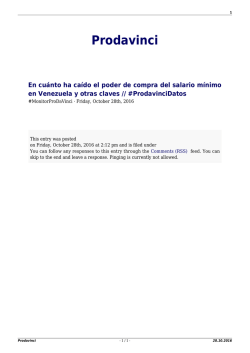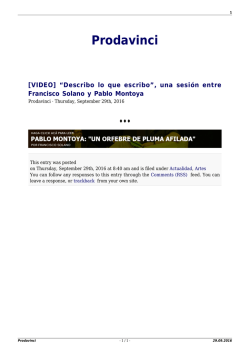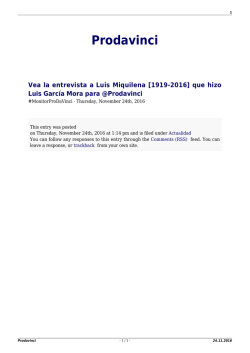
Almost 8 out of 10 internet users in the EU surfed via a
260/2016 - 20 December 2016 Internet use by individuals Almost 8 out of 10 internet users in the EU surfed via a mobile or smart phone in 2016… Different patterns across Member States in managing personal information More than 80% of persons aged 16 to 74 in the European Union (EU) used the internet in 2016, in many cases via several different devices. Mobile phones or smart phones were the device most used to surf the internet, by over three-quarters (79%) of internet users. They were followed by laptops or netbooks (64%), desktop computers (54%) and tablet computers (44%). During the last twelve months, more than 70% of internet users in the EU provided some kind of personal information online, many of them undertaking different actions to control access to this personal information on the internet. Almost half of them (46%) refused to allow the use of personal information for advertising and 40% limited access to their profile or content on social networking sites. In addition, 37% of internet users read privacy policy statements before providing personal information and 31% restricted access to their geographical location. This information, issued by Eurostat, the statistical office of the European Union, is part of the results of the survey conducted in 2016 on ICT (Information and Communication Technologies) usage in households and by individuals. Main devices used in the EU to surf the internet, by age groups, 2016 (as % of internet users over the last three months) 79% 94% Mobile phone or smartphone 83% 56% 44% 42% Tablet computer 47% Total 37% 16-24 years 25-54 years 64% 55-74 years 71% Laptop or netbook 64% 57% 54% 53% Desktop computer 54% 54% 0% 10% 20% 30% 40% 50% 60% 70% 80% 90% 100% Highest shares of surfers via mobile phone or smartphone in Spain, Cyprus and the Netherlands Mobile phones or smartphones were the devices the most used in 2016 by internet surfers in every EU Member State, except for the Czech Republic, Estonia, Lithuania, Poland and Slovakia where it was laptops or netbooks. In 2016, the highest proportion of internet users having accessed the internet via a mobile phone or a smartphone was registered in Spain (93% of those having used the internet over the last three months), ahead of Cyprus and the Netherlands (both 88%), Croatia (87%), the United Kingdom (86%) and Denmark (85%). At the opposite end of the scale, the lowest share was recorded in the Czech Republic (55%), followed by Poland (60%), Latvia (62%), Lithuania (63%) and Greece (66%). Among Member States, laptops or netbooks were used to surf the internet by at least three-quarters of internet users in the Netherlands (80%), Finland and Belgium (both 78%) and Denmark (76%), while desktop computers were used by more than two-thirds of internet users in Hungary, Luxembourg and Romania (all 68%) as well as Germany (67%). Finally, tablet computers were used to access the internet by less than half of internet surfers in a vast majority of Member States, with the exceptions of the Netherlands (66%), the United Kingdom (61%), Denmark (56%), Germany (55%), Luxembourg (53%) and Finland (52%). At EU level, young individuals aged 16-24 mostly preferred accessing the internet via a mobile or a smart phone (94%) as well as via a laptop or a netbook (71%), while the use of a tablet computer was most popular among those aged 25-54 (47%). Internet users having accessed the internet via a mobile phone or smartphone in the EU, 2016 (as % of internet users over the last three months) 100% 90% 80% 70% 60% 50% 40% 30% 20% 10% 0% Disparities in ways used to manage access to online personal information Disparities between the EU Member States can be observed in the way internet users managed access to their personal information on the internet in 2016. In twelve Member States, refusing to allow the use of personal information for advertising came first, with the highest shares being registered in Luxembourg (72% of internet users over the last twelve months) and Finland (71%), followed by the Netherlands (65%), Denmark (60%) and Estonia (59%). In nine Member States, access to personal information on the internet was principally managed through reading privacy policies, while this was managed via limiting access to profile or content on social networks in six others. Although restricting access to geographical location was not the most used tool in any Member States, more than half of internet users did so in Luxembourg (63%), Finland (58%), Austria and the Netherlands (both 52%). Main actions undertaken to manage access to personal information on the internet in the EU, 2016 (as % of internet users over the last twelve months) Refuse to allow the use of personal information for advertising 46% Limited access to profile/content on social networks 40% Read privacy policy statements 37% Restricted access to geographical location 31% 0% 10% 20% 30% 40% 50% Geographical information The European Union (EU) includes Belgium, Bulgaria, the Czech Republic, Denmark, Germany, Estonia, Ireland, Greece, Spain, France, Croatia, Italy, Cyprus, Latvia, Lithuania, Luxembourg, Hungary, Malta, the Netherlands, Austria, Poland, Portugal, Romania, Slovenia, Slovakia, Finland, Sweden and the United Kingdom. Methods and definitions The data source is the 2016 Community survey on ICT usage in households and by individuals. The survey covered individuals aged 16-74. In most countries it was conducted in the second quarter of 2016. Individuals were asked about frequency of internet use and about activities they had carried out on the internet in the last three or twelve months prior to the survey, at home or at any other location. Timetable A news release on the use of internet advertising by enterprises was published on 14 December 2016. For more information Eurostat website section on digital economy and society statistics. Eurostat database on digital economy and society. Eurostat Statistics Explained articles on internet access and use as well as on e-commerce for households and individuals. European Commission Digital Single Market strategy. Issued by: Eurostat Press Office Production of data: Vincent BOURGEAIS Tel: +352-4301-33 444 [email protected] Cristina CALIZZANI Tel: +352-4301-30 702 [email protected] ec.europa.eu/eurostat @EU_Eurostat Petronela REINECKE Tel: +352-4301-31 424 [email protected] Media requests: Eurostat media support / Tel: +352-4301-33 408 / [email protected] Main devices used by individuals to surf the internet, 2016 (as % of internet users over the last three months) Desktop computer Laptop or netbook Tablet computer Mobile phone or smartphone EU 54 64 44 79 Belgium 53 78 49 78 Bulgaria 58 51 19 71 Czech Republic 51 66 19 55 Denmark 40 76 56 85 Germany 67 71 55 82 Estonia 49 73 32 72 Ireland 25 67 37 84 Greece 49 62 31 66 Spain 45 58 42 93 France 60 63 46 71 Croatia 63 66 29 87 Italy 50 31 29 79 Cyprus 29 69 37 88 Latvia 54 59 25 62 Lithuania 42 69 23 63 Luxembourg 68 74 53 83 Hungary 68 64 22 77 Malta 42 69 45 83 Netherlands 64 80 66 88 Austria 56 69 35 82 Poland 49 74 21 60 Portugal 46 73 44 78 Romania 68 37 26 70 Slovenia 57 70 30 73 Slovakia 54 73 36 71 Finland 51 78 52 81 Sweden 43 70 49 84 United Kingdom 45 70 61 86 Norway 33 84 66 89 Former Yug. Rep. of Macedonia 59 54 17 81 : : : : Turkey Respondents could report more than one device. : Data not available Main actions undertaken to manage access to personal information on the internet, 2016 (as % of internet users over the last twelve months) Provided personal Read privacy policy information statements Refused to allow Restricted access Limited access to the use of personal to geographical profile/content on information for location social networks advertising EU 71 37 31 40 46 Belgium 71 29 34 49 48 Bulgaria 50 29 10 20 12 Czech Republic 67 45 14 15 25 Denmark 83 44 47 59 60 Germany 80 45 36 41 55 Estonia 77 42 44 49 59 Ireland 76 26 21 32 32 Greece 83 32 18 28 28 Spain 74 36 40 50 52 France 73 22 32 39 50 Croatia 65 50 37 55 50 Italy 52 33 11 22 31 Cyprus 61 22 16 34 26 Latvia 70 49 26 30 31 Lithuania 56 37 22 29 33 Luxembourg 92 43 63 64 72 Hungary 65 57 27 42 48 Malta 70 44 43 56 46 Netherlands 85 41 52 56 65 Austria 80 45 52 53 56 Poland 51 26 15 25 29 Portugal 49 44 48 57 52 Romania 31 24 7 15 15 Slovenia 59 34 24 32 35 Slovakia 74 59 18 29 31 Finland 80 50 58 58 71 Sweden : : : : : United Kingdom 88 43 38 50 54 Norway 87 42 47 60 56 Former Yug. Rep. of Macedonia 51 33 25 41 37 Turkey 63 32 19 36 29 Respondents could report more than one action. : Data not available
© Copyright 2026






